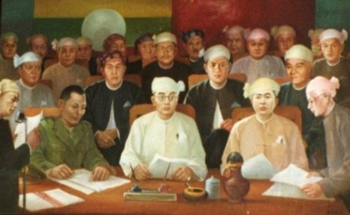On 21 September, the President’s chief negotiating aide U Aung Min, who was in New York ahead of his boss, told Reuters that the government was “willing to make all necessary compromises to bring peace to the country.” In addition, he said, “We will do whatever is necessary to complete the peace process before 2015. We don’t want to leave it to the next government.”
 He is not alone in saying that. David Tharckabaw, his counterpart from the United Nationalities Federal Council (UNFC), the alliance of 11 armed movements, who went later, also let it be known he wanted the job over and done with by 2015.
He is not alone in saying that. David Tharckabaw, his counterpart from the United Nationalities Federal Council (UNFC), the alliance of 11 armed movements, who went later, also let it be known he wanted the job over and done with by 2015.
This was in spite of the fact that the two sides have yet to meet to discuss the so called “framework for political dialogue,” one of the 6 points of the peace roadmap agreed at the recent meeting among representatives of armed movements and civil society organizations in Chiangmai.
Several questions are indeed in need of answers from each side before the planned meeting between the two sides toward the end of the year:
- What are the objectives of each side?
- What are the expected outcomes?
- What are the issues at stake?
- What are the positions of each side on these issues?
- What is each side ready to give in order to get what it wants?
Moreover, as peace is not only the exclusive concern of the government and the armed resistance movements, but the overriding interest of the people who have borne the brunt of the 64 years of our own War between the States, their voices and those of opposition political parties should also be taken into account.
Time is also needed to build up trust and confidence among all those concerned before the new Panglong is convened, according to experts who have been involved in several peace processes around the globe, past and present:
- Diplomacy and Diaspora
- Legal and constitutional preparation
- Media and communication
- Forming political alliance
- Humanitarian assistance
- Observation of ceasefire agreements
- Peaceful resolution of military matters
All these involve a lot of time, work and resources.
Of course, we may want to get the job done in 10 days like our founding fathers did at the 1947 Panglong. But don’t forget that even those 10 days was the result of more than a year’s preparation.
We can therefore hope for a quick remedy of our maladies but must also be well prepared for a protracted parley.



